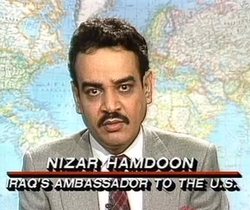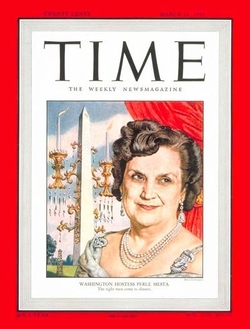There's been a sea of change in the politics of the Middle East, and I feel it personally in my Washington social life.
How it was. In the old days, the Arab-Israeli conflict overshadowed all else. Of course, plenty of other battles disturbed the Middle East through the years, such as the civil wars in Yemen (from 1962) and Lebanon (from 1974). But these were skirmishes compared to the Main Show, the fight over Israel's right to exist as a sovereign nation.
 Nizar Hamdoon (b. 1944) was Saddam Hussein's effective ambassador. |
The fundamentalist threat. Now there's something much bigger than a war: the imminent and growing danger of fundamentalist Islam. After twenty years of growth, this radical ideology rules in three countries (Afghanistan, Iran, Sudan) and may have effectively taken over in a fourth (northern Yemen). Fundamentalist Muslims pose dire threats to the regimes in Algeria and Egypt and are the key issue in a host of other countries, from Morocco to Turkey.
The fundamentalist threat is so great it has pushed the Arab-Israeli conflict to the side, at least temporarily. Fundamentalism threatens moderate Muslims as well as the Christians, Jews, and other minorities of the region. In other words, it renders old enmities less relevant and forges new alliances.
 Perle Meta (1889-1975) was the most famous Washington hostess, This cover dates from March 14, 1949. |
From the Algerian point of view, it was a gathering of friends to hear the foreign minister and (with luck) to inspire new enthusiasm for the anti-fundamentalist cause.
From the American point of view, however, the dynamics were quite different. Some of the guests were Arabists - individuals with an enduring soft spot for Arab despots, the sort of Old Guard you would have found at an Algeria embassy soiree ten or twenty years ago. But the other guests (myself included) were hardly the types who would have been invited to meet the foreign minister in years past. We of the New Guard favor strong U.S.-Israel ties, and that made us pretty close to persona non grata.
At the dinner this week, the Arabists looked at us pro-Israel types and bristled. This is our preserve, the look on their faces signaled. What are you interlopers doing here, muscling in on our lamb tajeen with prunes and almonds?
The Arabists probably have to get used to finding us at their parties. The fundamentalist threat appears to be around for a while even as the Arab-Israeli conflict is getting less heated (at least in diplomatic circles). Also, I suspect that non-fundamentalist Arabs, Algerians and others, find the New Guard very useful, for we reach a quite different segment of the American population than the Old Guard.
What's so odd is that many Arabs have moved emotionally beyond the Arab-Israeli conflict but American Arabists wallow still in its passions.
Mar. 21, 2015 update: I put this experience into context in "Americans Battle the Arab-Israeli Conflict."